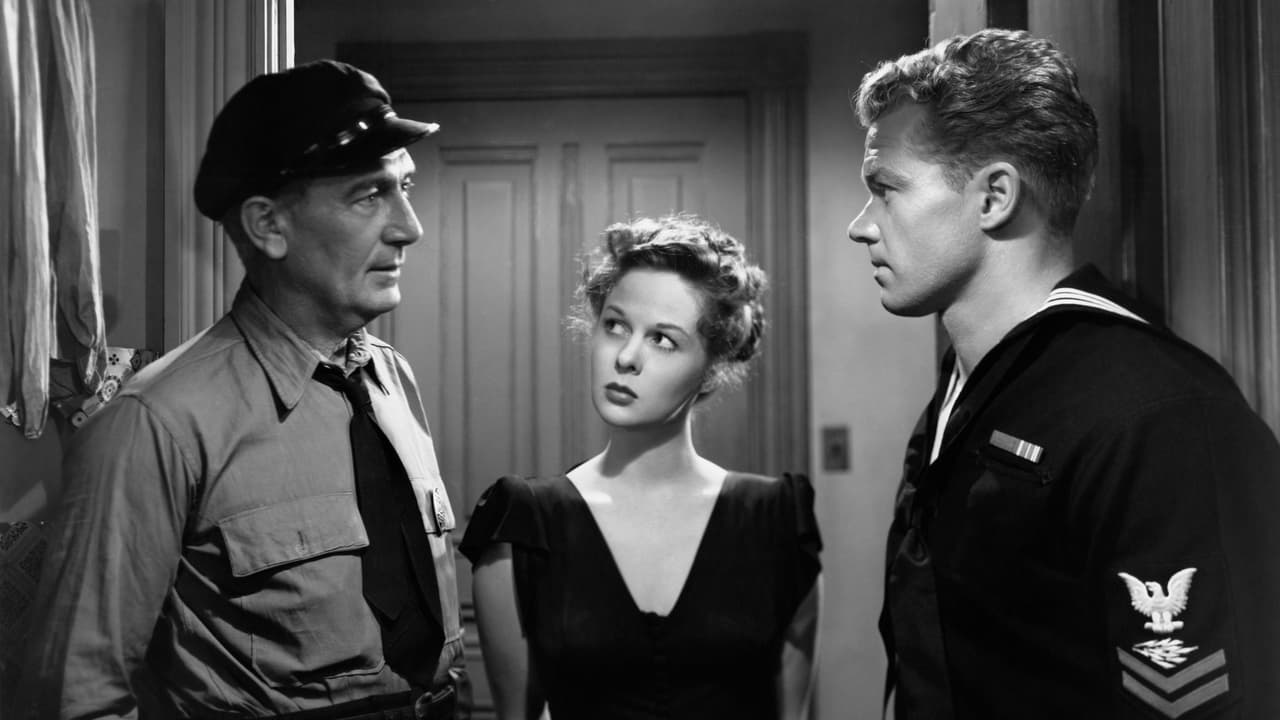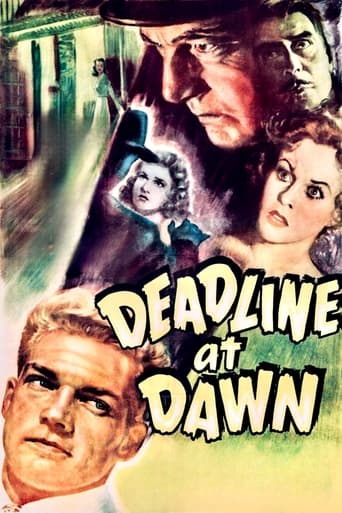

The beginning of Deadline at Dawn is pretty creepy. Marvin Miller comes to Lola Lane's apartment in the middle of the night, and they have a tense argument about him wanting moneys he owes him. Then, Lola is dead, Marvin is nowhere to be found, and Bill Williams has a wad of cash in his pocket he doesn't remember taking. Bill is a sailor, and his orders give him a dawn deadline before he ships out to find out who killed Lola so he doesn't get framed for it.Bill's character is written to be incredibly stupid and naïve, almost making the audience wonder if there's something wrong with him. He bumps into Susan Hayward, an older, hardened dance hall girl, and she decides to help him in his search. At first, the movie keeps harping on their age difference and that she sees her kid brother when she looks at him, but with no explanation, the script veers to the right and starts cooking up a romance. Where does Paul Lukas come in, you might wonder, since he got second billing? You'll have to watch the movie to find out.This isn't the best film noir or murder mystery to come out of the 1940s, but it is entertaining if you really like the genre and are looking for a rainy afternoon movie. Her beauty clearly stands out, but it's hard to believe the very next year, Susan Hayward would receive her first Oscar nomination!
... View MoreTerrifically gritty noir. Susan, still a B actress at the time took a big step forward with this little gem, one of the great overlooked noirs. She's tough and no nonsense but caring. She also looks phenomenal considering she had given birth to twin boys just before making this. Bill Williams is just right as the naive gob and Paul Lukas adds great support as a cabbie who lends a helping hand. The film is also full of wonderful touches, Susan's snappy no-nonsense talk, the incidental characters the leads come across and the sets and set-ups of the shots with intriguing little details just randomly placed in the background. Well worth seeking out.
... View MoreA young sailor on leave wakes up at midnight in a newsstand with bundles of money in his pockets and no recollection of his time spent with the wrong woman. Of course she turns out to be dead and he has until a bus leaves at 6am to discover the culprit or he gets the rap.I like films with concentrated wandering, this one has it, the entire film like a slow ride across New York after hours in the backseat of a cab with windows rolled down, it's the middle of August, the macadam breathing out the day's heat again, or like lounging by the open window of your apartment with lights turned off, glimpses of strange figures stalking the empty and sweltering streets below and imagining mischief from them.It has mood above all, latenight paranoia being sweated out from pores in the skin. Everything looks a bit unhinged in that magic-desolate way that is summer in the big city.But this is deeply noirish in a key way, the way of the dumb guy's dream that crystallizes the essence of noir. Our man was out at night dreaming but has no recollection what about, except it involved offers of sex and illicit money. We presume he's innocent because of his naive blond looks and because he's the one telling the story, and is bewildered as he does, because more likely suspects are paraded, stories are piled, testimonies, conjecture, a drunk man uncovers hidden truth, a cab driver reflects about love, but the puzzle persists, the puzzle that is the night of life; we cannot really know, there is a blank spot at the center. Emptiness behind the stories that we make up to narrate our private worlds.You will need no more eloquent parallel about what this is all about than a blind pianist among the suspects and being - mistakenly - sussed from his melodramatic reaction.So we have sinister happenings back in the waking world, itself rendered as something you wake up from. Then our film as a dream attempting inner balance, so of course thick in coincidence, in strange but kind souls assisting, capped off with a miraculous revelation in the end that absolves guilt.This is truly wonderful stuff that has burned itself into my visual imagination. It's clean and dark both, the shadows all in having traveled, having dreamed the night away.
... View MoreDeadline at Dawn (1946)If you can overcome, or overlook, the slightly stilted plot and the improbability of the events (in an O'Henry kind of way, if you know his clever short stories, though the actual writer is Clifford Odets, whose politics are not very visible), you'll be able to catch the really fine acting and directing here. And the nicely felt night crime drama that is really just a beautiful sappy love story (the best kind). The cast is small, the plot twists unreasonable but still enchanting, and the effect, in the end, is tightly wound.While you might think the murder is the central premise (and it's key, for sure), or the sailor's blackout is the main event (and it isn't, really), you will eventually see it's the sailor himself, his utter innocence, that is both the core of the film and the driving force. This is the Odets part of the writing, character driven, and the sailor, through some effect of drinking we assume, has had a brief blackout, and he comes to his senses on the streets of New York with a lot of cash in his pocket. He's troubled, but we sympathize. Then a woman he was with is found dead. Still, this sailor is such the definition of innocence, there's no doubt--almost no doubt--that someone else did it. But who? And how can he defend himself?Enter Susan Hayward, playing at first a kind of professional dance companion (the innocent side of prostitution, and a good match for our man). After work, she wants to help him because he's so clearly a good person, and then a cabbie strangely gets involved, too, sucked into the idea that justice will go wrong if the real killer can't be found. The dead woman had a couple of unsavory friends, and these two get into the plot in stages, and what we end up with is half a dozen clearly defined people all fighting for some small piece of personal clarity and internal well being.It helps that all the actors are first rate small time contributors (Hayward is the one star, and is terrific). It also helps that the whole scenario is limited in time and space, so we get to feel like we are there, in New York, in this small neighborhood at night. It's great stuff on that level alone. The director? It's his one and only film. But the cinematographer was an old pro at the peak of his career, Nicholas Musuraca, who did a whole slew of noirs and dramas, some worth seeing just for the photography ("Spiral Staircase" comes to mind, but see the IMDb list). So whatever the small time credentials of much of the cast, there is some seriousness here that won't let go.If the plot is a little preposterous, it's only because it's trying to package things too neatly. The writing is first rate, beyond plot structure, with some classic quotable lines that are either film noir staples or philosophical nuggets (the latter from the cabby, in particular). A film that would reward a second viewing just for the details of dialog and camera-work.
... View More